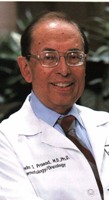
Ananda Prasad, M.D., Ph.D., distinguished professor of Internal Medicine for the Wayne State University School of Medicine and renowned zinc expert, will receive the 2010 Mahidol Award in the Field of Public Health for his groundbreaking research.
The award is presented annually by the Prince Mahidol Award Foundation of Thailand. Recognizing researchers and physicians for outstanding contribution in the field of public health "for the sake of the well-being of the peoples," the honor includes a medal, a certificate and $50,000.
"I did not know that I was being considered for the award," said Dr. Prasad, a member of the WSU Division of Hematology/Oncology and a member of the Karmanos Cancer Institute. "It is gratifying to have one's work recognized. I am completely, but pleasantly, surprised."
The Prince Mahidol Award Committee selected Dr. Prasad for the honor because of his studies and work with zinc as an element essential to human survival. He described the first cases of human zinc deficiency syndrome in 1963 in young adults. Zinc supplementation resulted in significantly increasing height, weight, bone development and sexual maturation.
"This pioneering work highlighted the importance of zinc in the health of humans and brought the attention of scientific and public health communities to further studying this important trace element," the committee said. "This discovery forms the basis that leads to zinc supplementation to improve the health condition of the population around the world. The study led to the understanding of how zinc deficiency affects human white blood cells and lowers (the) host defense system."
During the past 50 years Dr. Prasad has made important strides researching the mineral zinc, as well as contributing significantly to the field of hematology and sickle cell disease. His work with zinc began when one of his former professors received an invitation from the Shah of Iran to establish a medical curriculum at the University of Shiraz Medical School and invited Dr. Prasad to accompany him. Two weeks after his arrival, a 21-year-old man who looked like an 8-year-old boy came to Dr. Prasad. The patient lacked secondary male characteristics, was considered mentally lethargic and ate clay. Dr. Prasad diagnosed the man's condition as extreme anemia, but couldn't understand how such a condition came about because most males do not develop anemia without bleeding.
The condition was so prevalent in Iran that it was considered an epidemic. Dr. Prasad studied the condition and hypothesized that because plants do not grow without sufficient zinc, perhaps people do not either. In the developed world, zinc abounds in a variety of food sources, such as fresh fish, red meat, oysters and dairy products. In developing countries, diets primarily consist of breads and grains, which contain phytate, a substance that binds zinc and iron and prevents both minerals from being absorbed by the human body.
In 1961, Dr. Prasad published an article in the American Journal of Medicine suggesting for the first time that zinc deficiency could account for human growth retardation. In a subsequent paper based on studies done in similar dwarfs from Egypt, Dr. Prasad established the study subjects were zinc deficient. This paper was published in The Journal of Laboratory and Clinical Medicine in 1963 and later was republished in 1990 as a landmark article in the same journal. After the publication of these papers, Dr. Prasad started administering zinc through clinical trials, and his subjects began growing taller and developing male characteristics.
Since then, Dr. Prasad has continued to study the role zinc plays in human development. In 1975, he suggested the National Research Council set the Recommended Daily Allowance for zinc to 15 milligrams per day.
In addition, his zinc studies have saved countless lives in African and Asian countries, including India, Pakistan and Bangladesh. In these areas, the mortality rate from infantile diarrhea approached 85 percent. When the United Nations Educational, Scientific and Cultural Organization adopted zinc supplements to combat infant diarrhea in these regions, that mortality rate dropped to 15 percent. In December 2009, TIME magazine named zinc the "miracle mineral."
A total of 72 nominations from 31 countries were considered for the Mahidol Award. The award is named for Prince Mahidol of Songkla, considered the father of public health and medicine in Thailand. Dr. Prasad said he will attend the award ceremony in January.